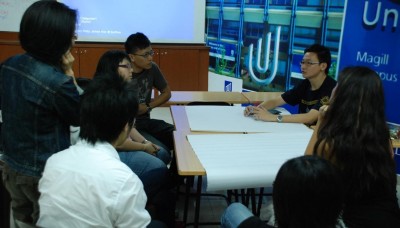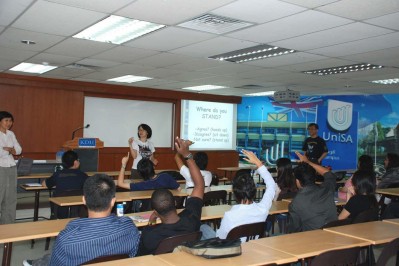Interview by James Chow of the Epoch Times – May 27, 2009 (Special Edition, June 2009) – which may be found here.
 The Malaysian Bar Council is now seen by many as one of the most active defenders of Human Rights in the country. Its Human Rights Committee (HRC) through its educational and training programmes also facilitates the acquisition of legal knowledge by members of the legal profession and others. The Epoch Times recently caught up with Mr. Roger Chan Weng Keng, the co-chair of the Human Rights Education Advancement And Training (HEART) working group of the HRC to interview him about the Human Rights trainings of the Bar and about Human Rights concepts in general.
The Malaysian Bar Council is now seen by many as one of the most active defenders of Human Rights in the country. Its Human Rights Committee (HRC) through its educational and training programmes also facilitates the acquisition of legal knowledge by members of the legal profession and others. The Epoch Times recently caught up with Mr. Roger Chan Weng Keng, the co-chair of the Human Rights Education Advancement And Training (HEART) working group of the HRC to interview him about the Human Rights trainings of the Bar and about Human Rights concepts in general.
Epoch Times: Could you please introduce the HRC of Bar Council and its Human Rights training programmes?
Roger: The HRC is actually one the many committees set up by the Bar Council of Malaysia as empowered by the Legal Profession Act 1976. The main objective of our working group is to create Human Rights awareness and empowerment among the lawyers as well as working to other stakeholders such as the policy makers, civil society and interest groups on Human Rights issues and initiatives.
Epoch Times: When did the HRC start organizing the Human Rights trainings?
Roger: These training and educational programmes have been there all the time. However they have been picking up vigour in terms of more requests from many quarters probably I guess it is because of increase membership at the Bar and probably Human Rights activism seems to have struck the right cord with Malaysians these days.
Epoch Times: How is the process of organizing the Human Rights training?
Roger: Hardwork, patience and coordination bearing in mind that not every resource persons is free or busy at the same time. So resource and expertise are definitely pre-requisites. Next come the tailoring of content when you have to be apprised of the latest update in the law, Human Rights development, issues and initiatives. The dynamics of Human Rights is an on-going sort of thing, developing everyday. And it’s important that the training is able to meet this challenge, perhaps even going one step ahead of its development.
Epoch Times: What are the contents of the trainings?
Roger: The content basically introduces people to the concept of Human Rights by examining all the International Human Rights Treaties, Instruments, Protocols and Conventions, Constitutional law issues and its relation to the Universal Declaration of Human Rights, Police Powers, Migrant Workers and Orang Asli (Indigenous groups) Issues, Freedom of Religion, Preventive Detention laws like the Internal Security Acts (ISA), Freedom of Expression, and the like.
Epoch Times: In one of your trainings, the trainer didn’t place a label on controversial laws such as ISA or Sedition Act but instead encourage discussion among the students.
Roger: Yes, we believe that we should approach Human Rights via interactive sessions, not by indoctrinating people. We encourage people to open their mind freely and voluntarily. So that is why you see we come out with a simple statement during the training. We then asked the students: ‘Do you agree, do you disagree, or not sure?’ We encourage them to take a position. This is what freedom of conscience is all about. You will be surprise some may even change their original positions which they were quite comfortable with after thinking more in-depth about the topic, post input. I prefer to call all these activities an interactive-analytical-investigative approach. It’s good brainwork, in the sense of being independent in our thinking of issues. One can gauge the level of consciousness raised after that if these training are properly conducted.
Epoch Times: Why do lawyers want to volunteer their valuable personal time on these free trainings?
Roger: This is a good question. People have assumption that lawyers are only busy making money but I think that sort of thinking is wrong, because there are still many lawyers out there with a conviction in Human Rights. The other reason I think would be there is everything for everybody in this country to gain if a sort of Human Rights culture is cultivated and ingrained in all Malaysians. This culture got to be steeped and thickened through a conscious Human Rights educational programme, as many of the issues this country has to grapple with can be resolved by respecting the Human Rights of one another. Besides, there are a lot of people who are still unaware of Human Rights. You are only aware of it if you find one day that it has been taken away, and there is left no more. By which time the violation will be much more difficult to deal with, because we don’t have a Human Rights culture to counter that. We also do these trainings because it is a humanly right thing to do. As I am talking there are still Human Rights abuses and violations happening in other parts of the world.
Epoch Times: What sort of Human Rights violations?
Roger: In a general sense, persecutions instead of prosecutions. Corruption instead of transparency. Abuse of Power instead of accountability. The list is not exhaustive.
Epoch Times: Why is Human Rights important to solve these problems?
Roger: Human Rights is a set of minimum achievement standards laid down in the Universal Declaration of Human Rights (UDHR). We only have to achieve the minimum, and I think that can be done if we have the political will. The rules laid down in UDHR are what member states of the United Nations agreed upon after a long series of debate, in the aftermath of the Second World War. It’s supposed to serve as a lesson after so much killings, bombings and genocide. One such rule calls upon us to respect the dignity of a person and to treat them as equal.
Epoch Times: Some people say Human Rights is not for Asian countries, or not relevant to Asian Values. Human Rights is more for western countries? What do you think?
Roger: I think this is a wrong way to treat Human Rights. You got to be precise and clear what are the Asian values. Which part of irrelevancy and the extent of irrelevancy these people are talking about have not been clearly shown. Otherwise it is a vague connection and leave much room for abuse of the individual right as against the State. The reason why we have to define Asian values and enumerate a list of these values is very important. Values cannot be just a matter of rhetoric and assertion. Take for example the allegations against the Chinese Government of organ harvesting against Falun Gong members in China. The reason I think they are many right activists who do not see it as Asian values is because they cannot find the Asian value. So they have resorted to International Human Rights standards because these allegations have an international and UDHR component.
Epoch Times: Can our constitution protect our Human Rights?
Roger: Under our constitution, no doubt there are provisions for Civil Liberties subject to the various provisos. I think the question should be the other way round, like how a strong Human Rights Consciousness could improve on the Constitution instead. The reason I am saying this is, you could still legally have a Constitution that take away your Human Rights.
Epoch Times: How effective are the Human Rights trainings? Do you see any changes?
Roger: They are very effective. Many participants have said the training courses are very useful, and they are more aware of Human Rights now. They look forward to more training of this nature. I think the HRC should engage this initiative. We also definitely need cooperation from NGOs and other Human Rights organizations in this regard. Hopefully one day when our consciousness is not only raised and we cannot live without Human Rights, and schools will come on board to teach the subject.

KEEP RIGHTS BRIGHT TO BIND MANKIND
Let's remember that basic human rights
Are basically God-given rights to mankind
Let's uphold them in manners truly bright
And ensure that they will worldwide fully bind
(C)Samuel Goh Kim Eng – 020609
http://MotivationInMotion.blogspot.com
Tue. 2nd June 2009.